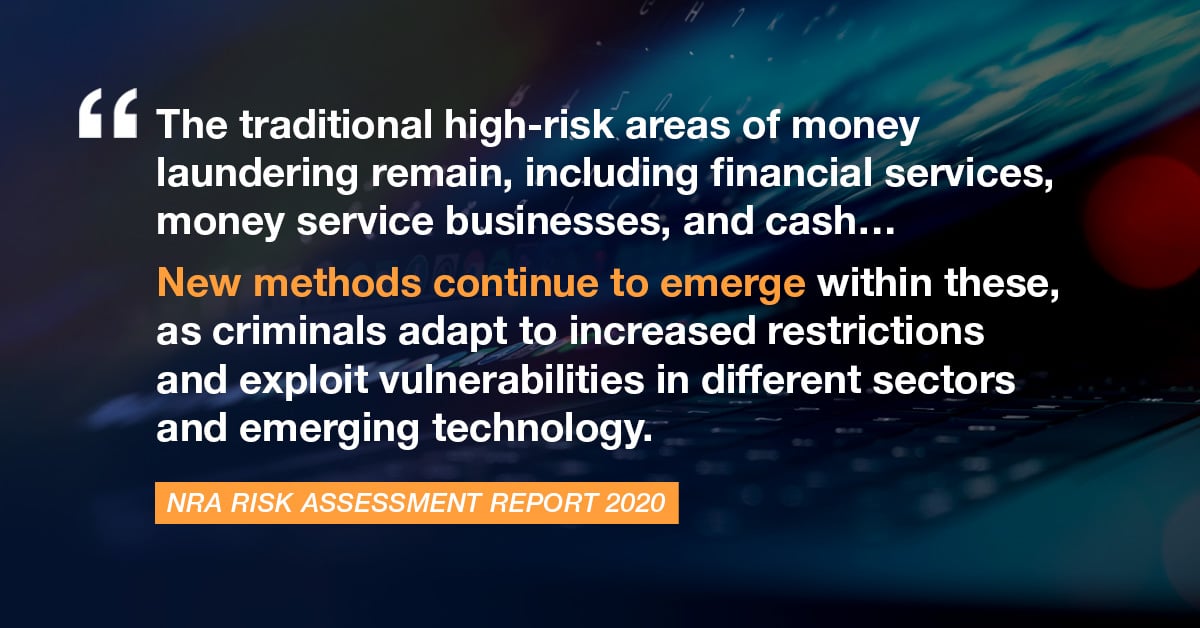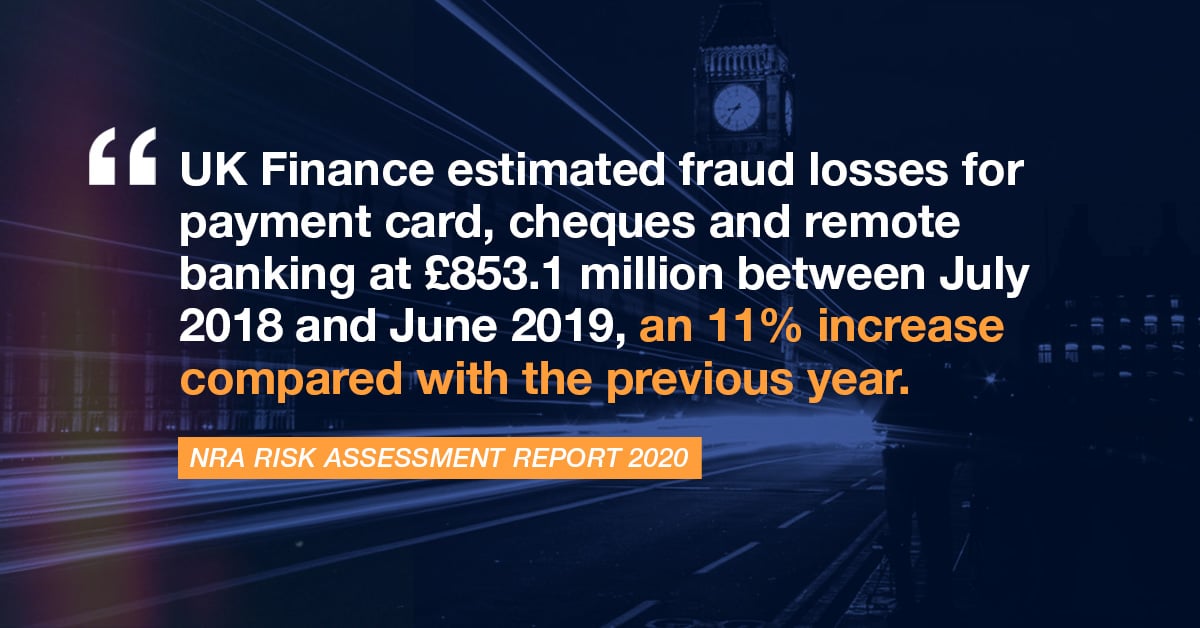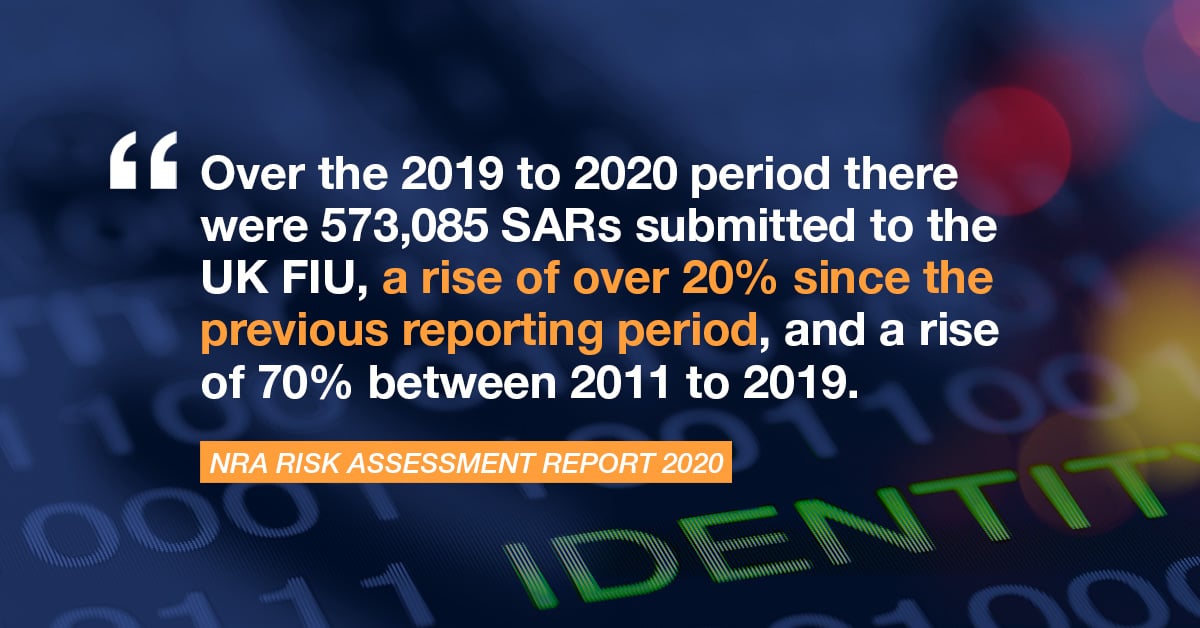In December 2020 the National Risk Assessment (NRA) of money laundering and terrorist financing 2020 was published. This document “is the UK’s stock-take of our collective knowledge of money laundering and terrorist financing risks in the UK.” According to the document its aim is to help create “shared understanding of money laundering and terrorist financing risk” because it is “crucial to effectively mitigate the issues, and we must continue to update our understanding as it evolves.”
The Jade ThirdEye team is part of this community and the effort to fight financial crime: we are a vendor of automation solutions for transaction monitoring and customer screening, and we help financial institutions in the UK meet their AML/CTF obligations more effectively. So we review these kinds of publications to update our own understanding -- and the service, products, and support we provide to customers -- “as it evolves.”
Applying this lens to the report, we came away with the top 5 insights insights related to ongoing risks, opportunities for technology, and requirements for evolving solutions.
1. Make sure your tools and teams can easily respond to changes:
According to the report, events like Covid-19 changed financial patterns; there were increases of mobile banking, remote transactions, and transfers of funds from securities, and many more shifts in activity.

Key Takeaway: While the report also states that “transaction and pattern monitoring continue to be an important line of defence,” it’s clear that – given all of this information about the fluidity of criminal activity -- monitoring programs and their automation components MUST be able to respond quickly to new patterns of activity. One way to do this, for example, is by giving teams the ability to change, test and deploy transaction monitoring rules on their own easily through a browser, so changes are quick even when working remotely.
2. Use your tool correctly
The NRA includes several useful case studies, and more than one of them point to failure in controls and operationalisation in programs, even when tools and automation were present. For instance, in one case study, “The FCA’s investigation identified failings in a number of areas, including Commerzbank London’s failure to conduct timely periodic due diligence on its clients, which resulted in a significant number of existing clients not being subject to timely know-your-client checks…1,772 clients were overdue updated due diligence checks.” The case study also pointed to a failure to “address long-standing weaknesses in its automated tool for monitoring money laundering risk on transactions for clients.
The FCA continues to see deficiencies in control frameworks and their implementation across all types of retail and wholesale firms.
Key Takeaway: It can be easy to fall behind on your obligations and difficult to catch up; you need assurance and oversight of your tools to achieve the goals of your program, and that’s easier if your tools are fit for purpose and the vendor you work with is available to assist you when you need to make changes.
3. Go further with your transaction monitoring tools
The National Crime Agency (NCA) assesses it is likely that fraud in the UK is increasing and there has been a considerable rise in reported losses. The Office of National Statistics report that adults in England and Wales are more likely to be a victim of fraud than any other crime type.

Key Takeaway: Our recommendation: it’s possible to leverage your AML automation tools to detect fraud, and if you can, you should. It increases your return on investment in your tool and extends your ability to fight financial crime. One of our customers, Skipton Building Society discusses the use of Jade ThirdEye for fraud detection.
4. Business risks remain
The report makes it clear that enforcement and fines are not impacted by changes in the environment, so much as criminal activity has evolved rather than slowed: “investigations continue and have not been halted due to the pandemic.” The FCA continues to impose financial penalties and states that further investigations are on-going.
Key Takeaway: Requirements and business risk remain, despite a new normal. If you’re using automation tools to support your AML/CFT programme, make sure you have the business continuity and reliance you need. Consider whether upgrades, updates and changes are possible even in remote circumstances You can also listen to Monmouthshire Building Society who recently shared their journey through an entirely remote installation of their new AML tool, Jade ThirdEye.
5. Get SARs right
While the report highlights that the UK is undertaking a SARs Reform Programme, which will overhaul the current SARs system, the value of SARs and the importance of reporting is significant; the NCA states that SARs are a critical intelligence development resource for law enforcement in tackling money laundering, terrorism, serious and organised crime, corruption and fraud, providing immediate opportunities to stop crime and arrest offenders, contributing to the UK’s understanding of crime and informing strategies to reduce its impact.

Key Takeaway: As volumes increase, so can costs of compliance. You can’t just grow staff, you should consider how technology can play a part. One of the foundation programmes is good detection, and detection can be more effective and efficient with automation and good rules in place.
Conclusion: The reason to review the NRA report is ultimately the same reason that might drive an evaluation of technology, vendors, and capability to improve your AML/CFT programme: having the right information and the right controls in place is all about decreasing the impact of financial crime on society. According to the paper, “It remains difficult to quantify the scale of the money laundering threat to the UK, but it is likely there has been an increase in the amount of money being laundered since 2017… serious and organised crime (SOC) continues to have more impact on UK citizens than any other national security threat, affecting a wide range of public services, infrastructure, and vulnerable individuals on a daily basis. SOC has a considerable impact on the UK economy, costing an estimated £37 billion per year.”
Insight: It’s more important than ever to invest in your programme and ensure you have the right tools in place to make it work the way it needs to.
Curious about how you can reduce your risk and improve your AML/CFT programme?
Get in touch with us!

